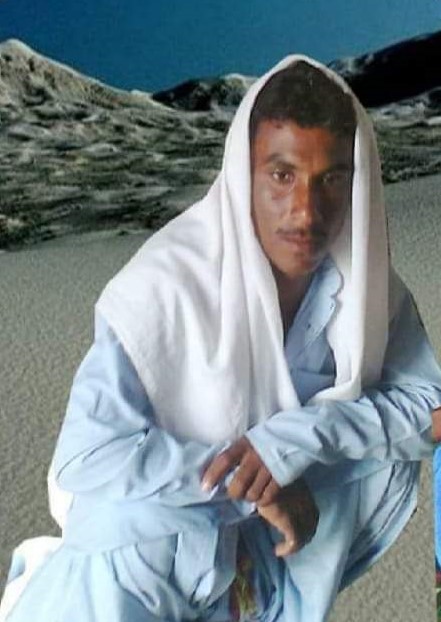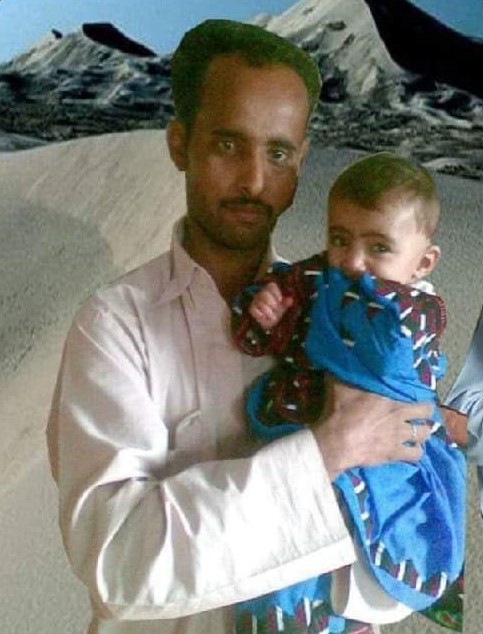Historical Background of Awaran District
Young Nawaz Baloch’s wedding had taken place just two days prior, and the atmosphere was filled with joy. His mother, sister, parents, and relatives were all celebrating, brimming with happiness. Nawaz and his bride, Gulshan Baloch, planning the start of their new life together. Hailing from the impoverished Baloch area of Maripur in Karachi, Nawaz had his marriage arranged with a close relative’s daughter in Jahoo, a remote area of Balochistan distant from Karachi. Consequently, Nawaz’s entire family had travelled there and were still residing in the area.
Preparations to return home were underway when, on the morning of February 19, 2014, an unforeseen event occurred. Just like any other morning, residents were still emerging from their slumber when the sound of helicopters disrupted the peace. As the helicopters hovered overhead, hundreds of military trucks descended upon the small village of Koharo. Some soldiers entered Nawaz’s home and fatally shot him in front of Gulshan.
On the other hand, the nearby village of Mulla Gazzi, situated a short distance from Koharo, was also affected by this violent operation. Four Baloch individuals, including school teacher Noor Mohammad Baloch, were killed by shelling from military helicopters.
Jahoo is a tehsil of district Awaran. Before November 11, 1992, Awaran was administratively part of the Khuzdar district. Historically named Kolwah, it was later renamed Awaran and currently comprises three Tehsils and one sub-tehsil: Tehsil Awaran, Tehsil Jahoo, Tehsil Mashkay, and sub Tehsil Geeshkor. This region lags behind other districts in Balochistan and faces challenges due to state oppression. Located in southern Balochistan, Awaran is bordered by the coastal region of Gwadar to the southwest, Lasbela district to the east and south, Kharan district to the north, and Kech and Panjgur districts to the west, with Khuzdar situated to the northeast.
According to the recent census, the total population of Awaran district is 178,958. The majority of residents in Jahoo live below the poverty line. The primary livelihoods in the area centre around land ownership and livestock. The army has taken control of most schools, converting them into camps and outposts. Essential human rights and basic facilities are lacking, making it a deeply distressed area.
Currently, thousands of families have been displaced, becoming Internally Displaced Persons (IDPs) due to state oppression and ongoing military operations in Awaran. Many are forced to lead a refugee life in Iran and Afghanistan, though this is not reflected in the current census. According to the Baloch National Movement’s welfare department, 1,460 individuals from the Awaran district now reside in Iran’s Balochistan province. Additionally, many families who fled Awaran have resettled in various locations in Sindh and other districts of Balochistan.
Martyrs of Dhomag Jahoo Year 1971
- Atta Muhammad, son of Kharena
- Mohabbat Khan, son of Kharena
- Muhammad Hasan, son of Chhutta
- Moosa s/o Chhuta
- Muhammad Kareem, son of Miskan
- Neto
- Bibi Sumri d/o Dilamrad
- Bibi Pirari d/o Isa
- Allah Bakhsh, son of Musa
- Mureed s/o Moosa
- Murad Bakhsh s/o Moosa




Other two of the martyrs are siblings of Noor Muhammad, son of Beeberg from Sunneri Mashkay.
In recent years, military operations commenced in 2013, with the first operation occurring on April 19, 2013. During this operation, Ustad Ali Jan, a member of the central committee of the Baloch National Movement and a Baloch scholar, was killed by the Pakistani army. Subsequently, a second operation resulted in the deaths of five innocent individuals at the hands of the Pakistani army. Following these events, such operations became a daily occurrence.
State brutality and violence in Jahoo on February 19, 2014
The Pakistan Air Force and ground forces jointly conducted a violent operation on February 19, 2014, in the Malani Gazi area of Tehsil Jahoo, Awaran district. Men and children were also targeted during the operation. Malani Gazi is a village consisting of fifty houses located at the bank of Gazzi River, Union Council Korak.
According to the eyewitnesses, “People were not completely awake from their sleep when their eyes were opened by the rumbling of helicopters. They were under siege by military convoys consisting of helicopters in the air and hundreds of trucks on the ground.” The people were not able to understand the matter well that the army started entering the houses and kept shouting at the people and telling them not to leave the houses and if anyone tried to escape, they would be killed. But staying at home didn’t help either. Some soldiers entered Nawaz’s house and shot him in front of the newly-wed bride and his parents. On the other hand, Pakistani army helicopters in Mulla Gazzi started firing from their machine guns, which hit five people: school teacher Master Noor Muhammad son of Mulla Musa, Talib Hussain son of Malang, Ghulam Jan son of Noora, and Taj Muhammad son of Hajo.
On the other hand, the army rounded up the people and blindfolded them, then began loading them into trucks. Another team started setting fire to houses, including the home of Master Shahdad, a senior member of the Baloch National Movement, where his entire family was inside. The Pakistani army did not spare even the speechless animals, burning alive the cattle locked in the fences of many residents.
The bodies of the victims were taken into custody by the army. According to eyewitnesses, the army did not hand over the bodies to the heirs; instead, they threw the bodies into the Yusuf Kor (River), located ten kilometres away from Mulla Gazzi village.
In this operation, more than 70 people were forcibly disappeared after being detained by the Pakistani army. After a few days, all other detainees were released from army camps in District Lasbela and Awaran. However, senior member of the Baloch National Movement and Balochi language poet and writer Hasil Hasrat, son of Mulla Abdul Rehman, and student Daulat, son of Mulla Abdul Karim, remain forcibly disappeared and are still in the custody of the Pakistani army.
The day after the bloodbath by the Pakistani army, BBC Urdu Service correspondent Riaz Sohail visited Jahoo and documented all the incidents in a documentary that is still available today. Apart from BBC Urdu Service, Baloch media also covered the brutality in Jahoo, but not a single news item was published in Pakistani media, and their behaviour has not changed to this day.
Note: PAANK will continue to inform human rights organizations, including the United Nations, about the serious human rights violations, highlighting incidents of mass punishment by the Pakistani army. It is the responsibility of human rights organisations, to hold the Pakistani forces accountable for the serious human rights violations and war crimes in Balochistan and to provide justice to the affected families.

